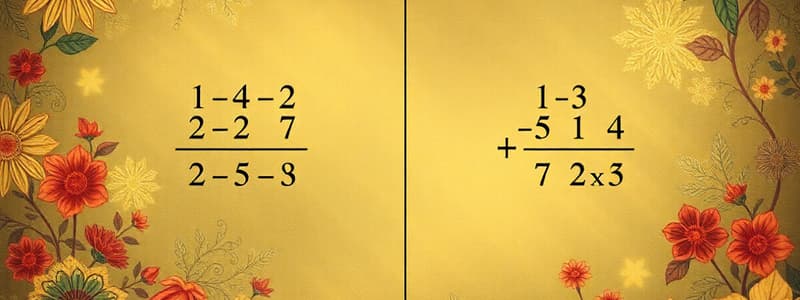Podcast
Questions and Answers
What is the result of $\frac{25}{76} \div \frac{57}{5}$?
What is the result of $\frac{25}{76} \div \frac{57}{5}$?
- $\frac{125}{114}$
- $\frac{125}{428}$ (correct)
- $\frac{75}{114}$
- $\frac{125}{699}$
If $\frac{1}{4}$ of the land is occupied by a club house and $\frac{10}{1}$ by a golf course, what fraction of the land is not occupied by either?
If $\frac{1}{4}$ of the land is occupied by a club house and $\frac{10}{1}$ by a golf course, what fraction of the land is not occupied by either?
- $\frac{3}{10}$
- $\frac{3}{4}$ (correct)
- $\frac{5}{10}$
- $\frac{1}{4}$
What is the total time taken by Andy, Bob, and Charlie to code a simple program if Andy takes 5 hours, Bob takes 3 hours, and Charlie takes 9 hours?
What is the total time taken by Andy, Bob, and Charlie to code a simple program if Andy takes 5 hours, Bob takes 3 hours, and Charlie takes 9 hours?
- 17 hours (correct)
- 18 hours
- 20 hours
- 30 hours
Arrange the fractions $\frac{5}{3}, \frac{1}{2}, \frac{7}{4}$ in ascending order.
Arrange the fractions $\frac{5}{3}, \frac{1}{2}, \frac{7}{4}$ in ascending order.
The product of $4 \frac{7}{10}$ and $1 \frac{1}{6}$ yields a fraction greater than 5.
The product of $4 \frac{7}{10}$ and $1 \frac{1}{6}$ yields a fraction greater than 5.
Dividing $\frac{57}{76}$ by $\frac{25}{5}$ results in a fraction less than 1.
Dividing $\frac{57}{76}$ by $\frac{25}{5}$ results in a fraction less than 1.
The fraction of land occupied by the club house is $\frac{1}{4}$.
The fraction of land occupied by the club house is $\frac{1}{4}$.
The total time taken by Andy, Bob, and Charlie to complete the program is 15 hours.
The total time taken by Andy, Bob, and Charlie to complete the program is 15 hours.
The fraction of land not occupied by either the clubhouse or the golf course is $\frac{3}{8}$.
The fraction of land not occupied by either the clubhouse or the golf course is $\frac{3}{8}$.
Flashcards are hidden until you start studying
Study Notes
Multiplication of Fractions and Mixed Numbers
- Multiplying fractions involves multiplying the numerators and denominators.
- Multiplying mixed numbers requires converting them into improper fractions before performing multiplication.
- Simplifying fractions by dividing both the numerator and denominator by their greatest common factor is essential.
Division of Fractions and Mixed Numbers
- Dividing fractions involves multiplying the first fraction by the reciprocal of the second fraction.
- The reciprocal of a fraction is obtained by inverting the numerator and denominator.
- Dividing mixed numbers requires converting them into improper fractions before performing division.
Solving Word Problems
- To solve word problems involving fractions, identify the relevant information and determine the required operation (multiplication or division).
- Understanding the concept of "of" in context of fractions signifies multiplication.
- The word "divided" or "shared" usually refers to the operation of division.
Fractions in Ascending Order
- To arrange fractions in ascending order, it's necessary to ensure they have the same denominator.
- Once the denominators are the same, compare the numerators to determine the order.
Total Time Calculation
- To calculate the total time, add up the time taken by each individual.
- Ensure to perform the calculation using compatible units (e.g., hours).
Multiplying Fractions and Mixed Numbers
- Multiplying fractions involves multiplying the numerators and the denominators.
- When multiplying mixed numbers, convert them to improper fractions first.
- Simplify the resulting fraction, if possible.
Dividing Fractions and Mixed Numbers
- Dividing fractions is the same as multiplying the first fraction by the reciprocal of the second fraction.
- Find the reciprocal of a fraction by switching its numerator and denominator.
- Convert mixed numbers to improper fractions before dividing.
Solving Word Problems
- Identify the key information in the problem.
- Set up the problem as a multiplication or division of fractions.
- Solve the problem and interpret the answer in the context of the word problem.
Examples:
- In Q1(a), multiply the numerator and denominator of each fraction.
- In Q1(b), convert mixed numbers to improper fractions and then multiply.
- In Q1(c), convert the mixed number to an improper fraction and then multiply.
- In Q1(d), multiply the fractions, then simplify, and then reduce to lowest terms.
- In Q2(a), find the reciprocal of the second fraction and then multiply.
- In Q2(b), convert mixed numbers to improper fractions and then multiply.
- In Q2(c), convert the mixed number to an improper fraction and then multiply.
- In Q2(d), convert all the fractions to their simplest form and then divide.
- In Q3, determine the fraction of land occupied by the clubhouse, then subtract from 1 to find the fraction not occupied.
- In Q4, find the fraction of time each person takes to code the program, arrange in ascending order, and then add to find the total time.
Studying That Suits You
Use AI to generate personalized quizzes and flashcards to suit your learning preferences.




